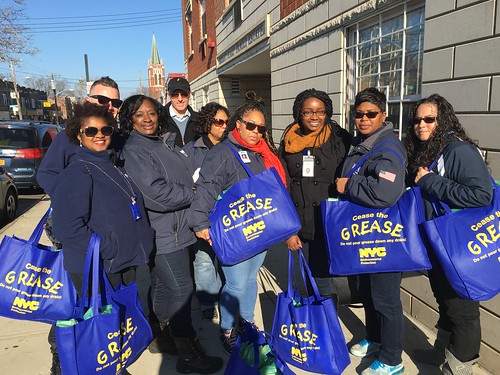FOR IMMEDIATE RELEASE 16-18 March 22, 2016 Contact: deppressoffice@dep.nyc.gov, (718) 595-6600 Door-to-Door Outreach Campaign to Visit 50,000 Homes in Southeast Queens to Encourage Residents to Properly Dispose of Grease and Help Reduce Sewer BackupsEducational Effort to Also Reach Food Service Establishments and BusinessesAccumulation of Grease in Sewer Lines is Responsible for 60 Percent of Confirmed Sewer Backups in New York CityPhotos and a Map of the Outreach Program are Available on DEP’s Flickr PageThe New York City Department of Environmental Protection (DEP) today announced that outreach teams have knocked on the doors of 25,000 homes in southeast Queens to spread the message that improperly disposing of grease down kitchen drains can clog pipes and lead to sewer backups. The door-to-door campaign began last September and will cover Community Boards 12 and 13, where there were more than 4,800 reports of sewer back-ups during the past five years. Investigations by DEP crews found that most of the backups were caused by grease blockages in the sewers. By the end of this summer, DEP anticipates reaching 50,000 households and more than 1,000 food service establishments with grease education kits and compliance information. In addition, partnerships have been established with local schools, community boards, elected officials, business groups, and religious and neighborhood organizations to encourage New Yorkers to properly dispose of grease in the household trash. “Grease clogs are among the leading causes of blocked sewer lines and are responsible for more than 60 percent of all sewer backups in New York City,” said DEP Commissioner Emily Lloyd. “By working with our community partners to ensure that grease is properly disposed of we can prevent costly problems for homeowners and businesses.” “We should be doing all we can to protect the environment, not only for ourselves, but for future generations, and it all begins with small changes on the local level,” said State Senator James Sanders Jr. “Many of us pour kitchen grease down the sink drain without a second thought, but this can lead to clogged pipes and sewer backups. I applaud DEP for its door-to-door campaign to educate residents about the proper disposal of kitchen grease, which will take place right here in my district, and for providing residents with specially lined bags to facilitate that disposal. I think this is an important step forward in rectifying a long overlooked problem.” “With the lack of sewer infrastructure in southeast Queens, homeowners and businesses can’t afford to have clogged pipes due to the improper disposal of grease,” said Council Member Donovan Richards (D-Laurelton). “Now that the Department of Environmental Protection is hard at work building out our sewer system, this campaign will help educate residents and business owners about how important it is to keep the current infrastructure clear of unnecessary grease clogs. I’d like to thank DEP Commissioner Lloyd for taking the time and resources to spread the word across the community.” “We commend the work DEP is doing creating awareness about the proper way to dispose of grease,” said Queens Community Board 13 Chairman Bryan Block. “Many parts of our board’s area suffer from flooding, and along with the capital projects taking place, this is yet another way to assure our communities have the proper drainage to prevent property damage and maintain a high quality of life.” Educational programs have been developed for the schools in the area, including P.S. 176, P.S. /I.S. 148 and I.S. 59, with interactive and multidisciplinary STEM (Science, Technology, English and Math) lessons. The curriculum introduces students and educators to New York City’s drinking water and wastewater systems. More information can be found here. In addition, information and grease education kits will be made available at as many community events and meetings as possible. The campaign will also include workshops at New York City Housing Authority developments, which include approximately 2,500 households within the two Community Boards. On-site visits will be made to commercial food establishments. DEP has embraced a data-driven, proactive approach to operate and maintain the sewer system. By using a range of digital tools and in¬novative practices, DEP develops targeted programs to provide a high level of service to customers while focusing on investments that will prioritize maintenance in the areas where it is needed most. This approach led to the development of an overall map and target grids for public outreach in southeast Queens. DEP manages New York City’s water supply, providing more than one billion gallons of water each day to more than nine million residents, including eight million in New York City. The water is delivered from a watershed that extends more than 125 miles from the city, comprising 19 reservoirs and three controlled lakes. Approximately 7,000 miles of water mains, tunnels and aqueducts bring water to homes and businesses throughout the five boroughs, and 7,500 miles of sewer lines and 96 pump stations take wastewater to 14 in-city treatment plants. In addition, DEP has a robust capital program, with a planned $14 billion in investments over the next 10 years that will create up to 3,000 construction-related jobs per year. This capital program is responsible for critical projects like City Water Tunnel No. 3; the Staten Island Bluebelt program, an ecologically sound and cost-effective stormwater management system; the city’s Watershed Protection Program, which protects sensitive lands upstate near the city’s reservoirs in order to maintain their high water quality; and the installation of more than 820,000 Automated Meter Reading devices, which will allow customers to track their daily water use, more easily manage their accounts and be alerted to potential leaks on their properties. For more information, visit nyc.gov/dep, like us on Facebook, or follow us on Twitter. | ||
